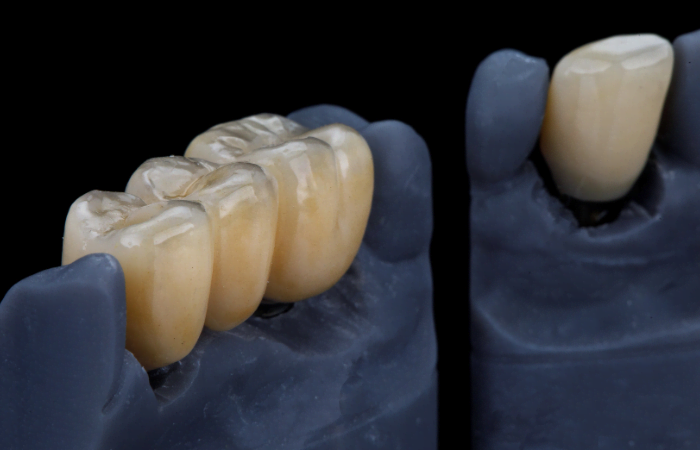
A dental bridge is a fixed dental prosthetic designed to replace one or more missing teeth. It literally "bridges" the gap created by missing teeth using artificial teeth, also known as pontics. The pontics are anchored in place by the natural teeth or dental implants on either side of the gap. Dental bridges not only restore the functionality of your teeth but also enhance your smile and boost your confidence.
When it comes to dental bridges, you have several options to choose from based on your dental needs and preferences:
A] Traditional Dental Bridge : This is the most common type and consists of a false tooth held in place by dental crowns that are cemented onto the adjacent teeth. It’s ideal for patients with healthy natural teeth on both sides of the gap.
B] Cantilever Dental Bridge : This type is used when there is only one natural tooth available to support the bridge. While less common, it’s a suitable option for certain cases.
C] Maryland Bonded Bridge : Also known as a resin-bonded bridge, this type uses a metal or porcelain framework to attach the pontic to the back of adjacent natural teeth. It’s a more conservative option as it doesn’t require extensive preparation of the supporting teeth.
D] Implant-Supported Bridge This is a modern and durable option that uses dental implants instead of natural teeth for support. It provides excellent stability and longevity, making it a preferred choice for many patients. Your dentist will evaluate your oral health to recommend the most suitable type of dental bridge for you.
Opting for a dental bridge comes with a host of benefits, including:
A] Restored Functionality : Dental bridges make it easier to chew and speak, restoring the functionality of your teeth.
B] Improved Aesthetics : By filling in the gaps, dental bridges enhance your smile and prevent facial sagging caused by missing teeth.
C] Maintained Dental Alignment : Gaps left by missing teeth can cause adjacent teeth to shift out of position. A dental bridge helps maintain proper alignment.
D] Cost-Effective Solution : Compared to other dental treatments like implants, dental bridges often have a more affordable upfront cost while still providing excellent results.
E] Quick and Non-Invasive Getting a dental bridge typically requires fewer visits and less invasive procedures than dental implants.
Finding the best dental clinic is crucial for a successful dental bridge treatment. Here are some tips to help you: Research Local Clinics Look for clinics that specialize in restorative dentistry and have good reviews. Check Credentials Ensure the dentists are qualified and experienced in performing dental bridge procedures. Ask About Costs and Financing Options Inquire about the dental bridge cost and whether the clinic offers payment plans or insurance support. Visit for a Consultation Schedule a visit to discuss your needs and assess the clinic’s facilities and approach to patient care.
Dental bridges are an excellent solution for restoring your smile and improving oral health. With various types available, from traditional to implant-supported, there’s a dental bridge to suit every need and budget. If you’re considering a dental bridge, don’t hesitate to consult a trusted dentist providing "dental care near me." Rest assured, a brighter, more confident smile is just a step away! For more information or to book a consultation, contact Diagnopein’s dental experts today. Let us help you bridge the gap to a healthier smile!